Greece, renowned for its stunning islands and historical landmarks, is also a top destination for scuba diving enthusiasts.The country's extensive coastline and numerous islands offer a variety of dive spots, from vibrant coral reefs and underwater caves to ancient shipwrecks and submerged cities. The warm Mediterranean climate makes it possible to dive year-round, and the diverse marine life, including dolphins, turtles, and colorful fish, enhances the underwater experience. Additionally, Greece’s unique underwater landscapes, shaped by volcanic activity, provide thrilling and picturesque environments for divers of all skill levels.
Top Dive Sites in Greece
1. Nea Kameni – Santorini

This volcanic island offers unique underwater landscapes formed by past eruptions. It’s ideal for beginners due to its relatively shallow depths and dramatic underwater scenery.
Location: Santorini, Southern Aegean Sea
Depth: Up to 30 meters (98 feet)
2. Chios Island Caves

Known for its labyrinth of colorful caves and tunnels, Chios offers diverse marine life including octopuses and sea turtles. It caters to both beginners and advanced divers.
Location: Chios Island, Eastern Aegean Sea
Depth: 5-40 meters (16-131 feet)
3. Elephant’s Cave – Kefalonia
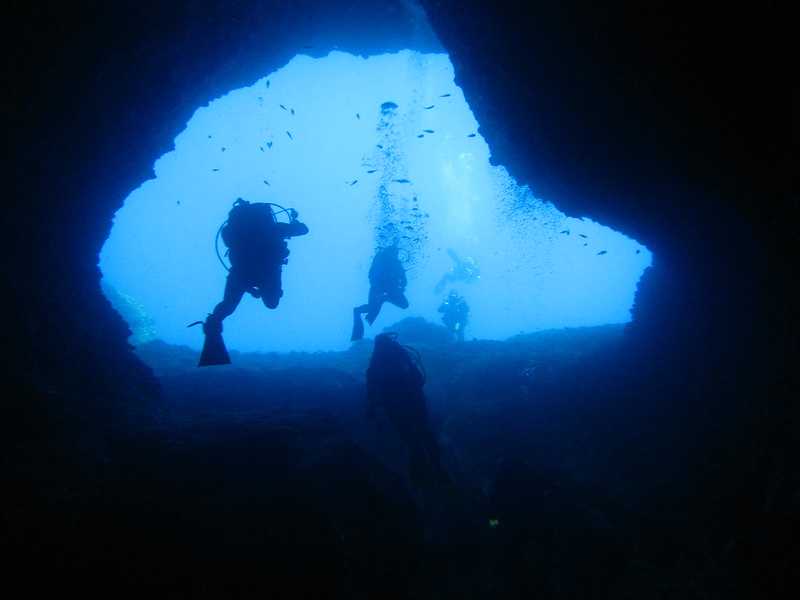
This submerged cavern is famous for its stalactites and stalagmites resembling an elephant’s trunk, along with a rich array of marine life. Divers can explore the HMS Perseus, a submarine wreck located between Kefalonia and Zante, as well.
Location: Kefalonia, Ionian Sea
Maximum Depth: 25 meters (82 feet)
4. Spinalonga Reef – Crete
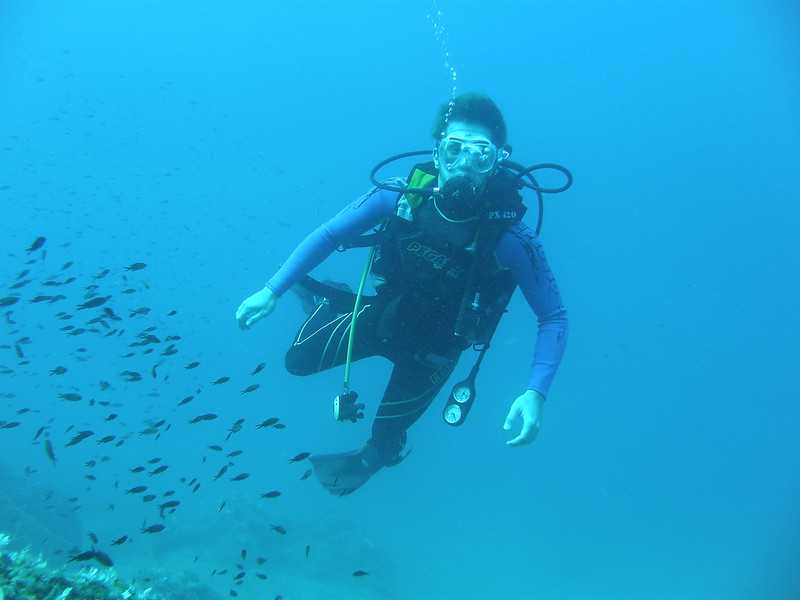
Spinalonga Reef is home to vibrant marine biodiversity, including schools of damselfish and occasional dolphin sightings. It’s suitable for advanced divers due to its depth and varied marine life.
Location: Crete, Southern Aegean Sea
Maximum Depth: 30 meters (98 feet)
5. Paleokastritsa – Corfu

This site features unique underwater rock formations and reefs, providing a memorable experience for divers. It can be challenging for beginners due to the complex underwater structures.
Location: Corfu, Ionian Sea
Depth: Varies
6. Mirmigi Reef – Lesvos
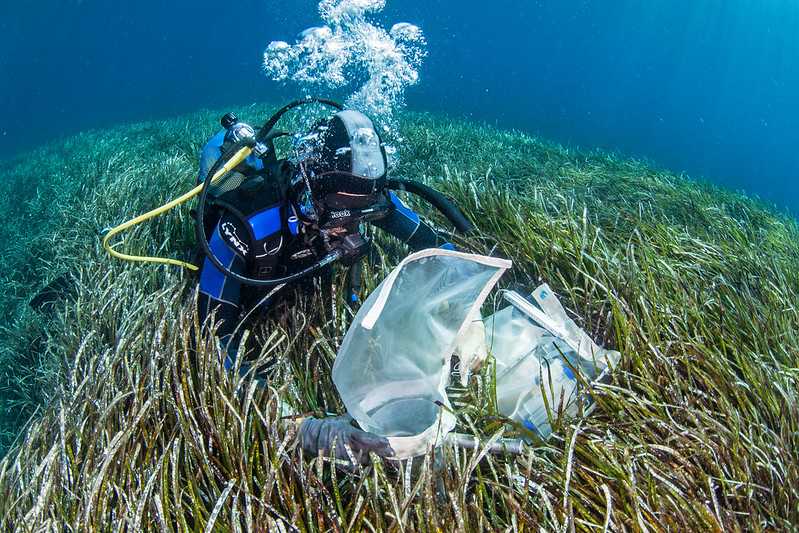
Known for its diverse underwater plant life and volcanic structures, Mirmigi Reef offers a unique diving experience with its floral marine environment.
Location: Lesvos, Aegean Sea
Depth: Varies
7. Mykonos – Anna II Wreck
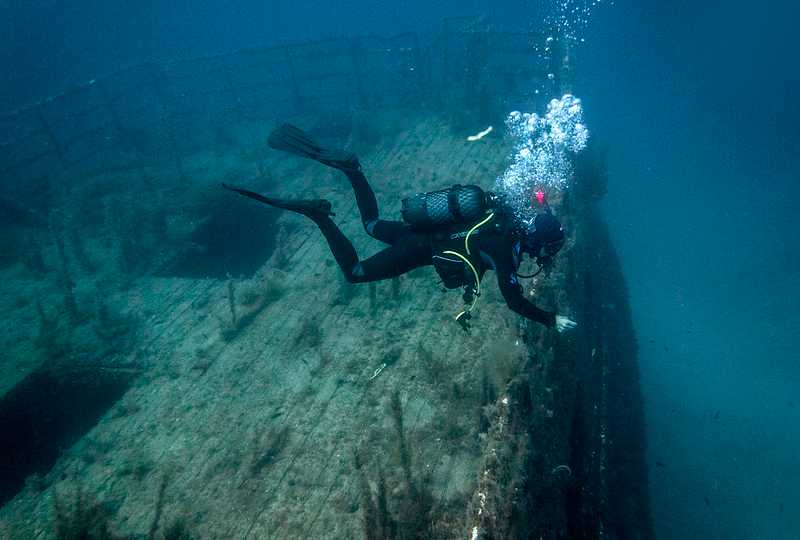
Dive among the remains of the Anna II wreck, offering an intriguing exploration of underwater shipwrecks. It’s best suited for more experienced divers.
Location: Mykonos, Aegean Sea
Depth: Varies
8. The Wall – Rhodes
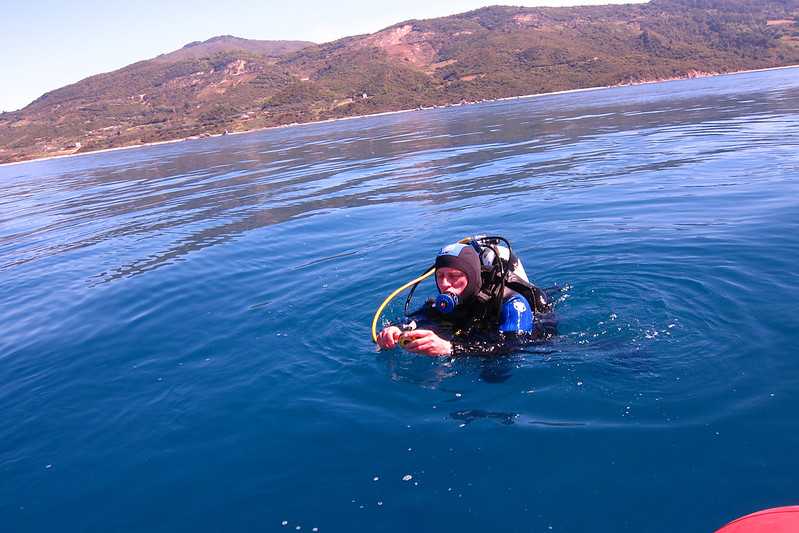
This dramatic vertical drop provides thrilling dives with opportunities to see larger pelagic species, such as tuna and barracudas.
Location: Rhodes, Aegean Sea
Maximum Depth: 40 meters (131 feet)
Islands to Explore to Dive in Greece
9. Peloponnese

Peloponnese is a treasure trove for divers, featuring a mix of historic shipwrecks, stunning reefs, and diverse rock formations. Loutraki is especially noted for its excellent diving conditions, and the Andros Wreck is a highlight for many due to its accessible depth and fascinating history. The area also offers opportunities for snorkeling among the ruins of the ancient city of Pavlopetri, one of the world’s oldest submerged cities.
Popular Diving Spots: Loutraki, Andros Wreck, Blue Canyon, Atlas Reef, Pilos, Foneas Cave, Vromoneri Reef, Voidokilia, Skalakia, Pavlopetri.
Unique Underwater Attractions: Coral reefs, shellfish, crustaceans, wrecks, rock formations, canyons, dolphins, sharks, groupers, barracudas, wrasse, moray eels, octopuses, rays, sponges, starfish, anemones, scorpionfish, turtles.
Depth: 6m - 28m
Costs: Individual dives – €40 - €65; Courses – €330 - €520
10. Ionian Islands

The Ionian Islands are famous for their breathtaking underwater environments. The clear turquoise waters around Paleokastritsa in Corfu and the impressive HMS Regulus wreck in Sivota attract divers from around the world. Zakynthos is notable for its marine park, which protects nesting loggerhead turtles and offers stunning dives in the Cave Tunnel.
Popular Diving Spots: Sivota, Corfu, Lefkada, Zakynthos, Kefalonia, HMS Perseus, Kastos, Atokos, Arkoudi, Harry’s Place, Nikiana Beach, Blue Cave, Skeleton, Hills, Garden, Black Water.
Unique Underwater Attractions: Seals, corals, pinnacles, walls, turtles, giant shrimps, octopus, lobsters, sea urchins, sponges, blennies, wrasse, sea bream, parrotfish, anemones.
Depth: 12m - 30m
Costs: Individual dives – €30 - €65; Courses – €330 - €520
11. North Aegean Islands
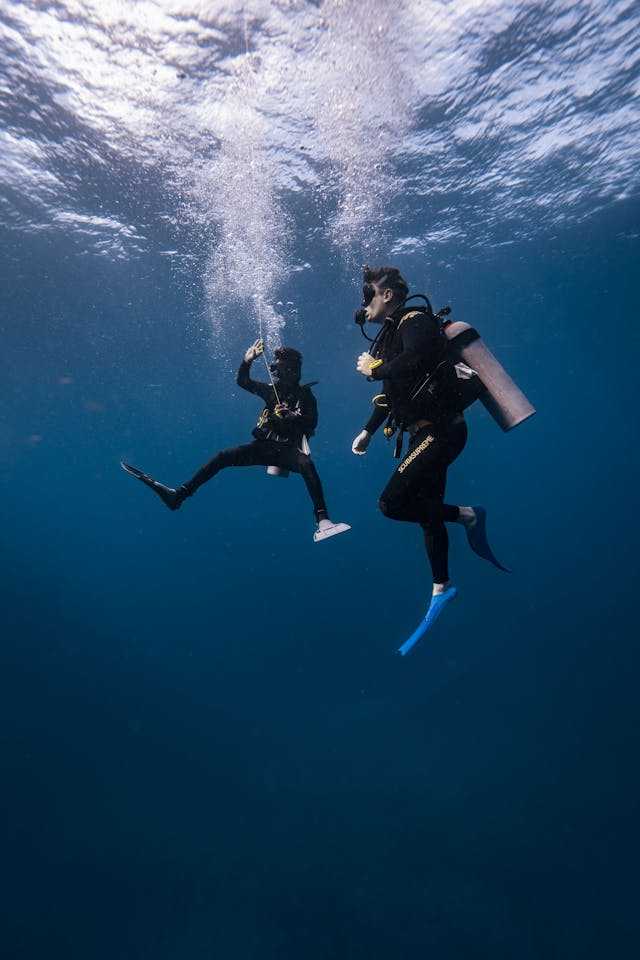
The North Aegean Islands, including Lesvos and Chios, offer exceptional diving opportunities. Explore shipwrecks, underwater caverns, and vibrant sea walls. Thasos, known as the Emerald Isle, is renowned for its lush landscapes and ancient marble quarries, providing a scenic backdrop for divers.
Popular Diving Spots: Lesvos, Chios, Thasos, Aliki, San Antonio Rocks, Giola Archangelos, Samos, Ikaria, Limnos.
Unique Underwater Attractions: Shipwrecks, underwater caverns, sea walls, wrasses, perches, tunnies, tunas, swordfish, sperm whales, turtles, corals, sponges, anemones, scorpionfish, morays, groupers, salpas, sarguses, combers.
Depth: 12m - 36m
Costs: Individual dives – €30 - €65; Courses – €330 - €520
12. Cyclades

The Cyclades are famous for their striking underwater scenery. Santorini’s caldera dives, with their volcanic formations and marine life, are particularly popular. Nea Kameni and Palea Kameni offer unique diving experiences with their dramatic drop-offs and wall dives. Amorgos, known for its clear waters, is a top destination for freedivers as well.
Popular Diving Spots: Ios wreck, Kea Island, Ksyla Bay, Santorini, Amorgos, Katapola, Aegial, Nikouria’s Cavern, Manina 3, Wreck of the Britannic, Theophille Gaulthier, the Burdigala, German Junker Airplane, Santa Maria.
Unique Underwater Attractions: Shipwrecks, basking sharks, blue sharks, sperm whales, seals, barracudas, damselfish, tunas, sponges, corals, spiral worms, macro-life, octopus, squids, seahorses.
Depth: 7m - 31m
Costs: Individual dives – €30 - €65; Courses – €330 - €520
13. Crete
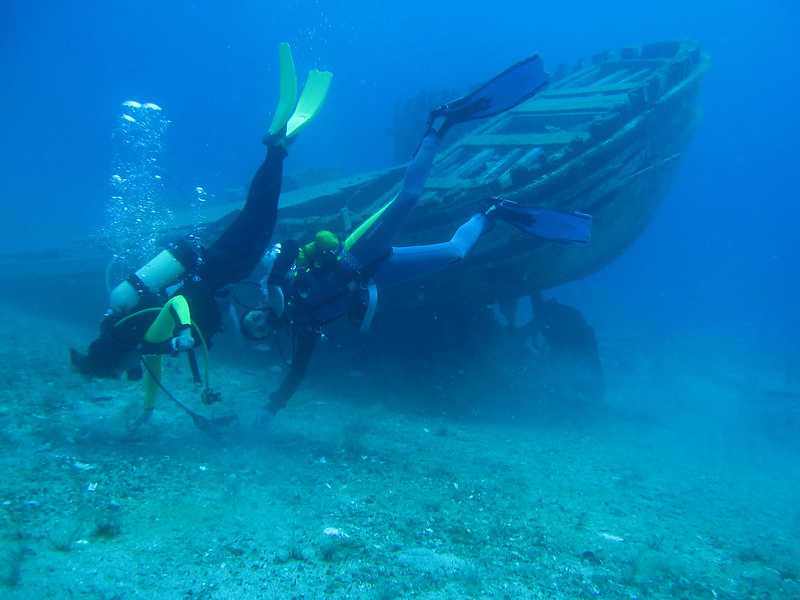
Crete offers a diverse range of dive sites with its 100+ locations. From the stunning volcanic reefs around Chania to the Elephant’s Cave, which holds the fossilized remains of extinct animals, Crete is a diver’s paradise. Night diving here is also a popular activity, providing a different perspective of the island’s underwater world.
Popular Diving Spots: Chania, Agia Pelagia, Hersonissos, Krikri, Pleora Point, The Wall, Kamini, Amphora Cave, Mantigo Wreck, Balcony, Chimney, The Island, Elephant Cave, Mononaftis, St George, Seagull Island, Schinaria.
Unique Underwater Attractions: Basking shark, blue shark, seals, turtles, black corals, dolphins, octopuses, blackfish, nudibranchs, lobsters, lionfish, stingrays, groupers, shrimps, rock formations.
Depth: 12m - 40m
Costs: Individual dives – €30 - €65; Courses – €330 - €520
14. Dodecanese Islands
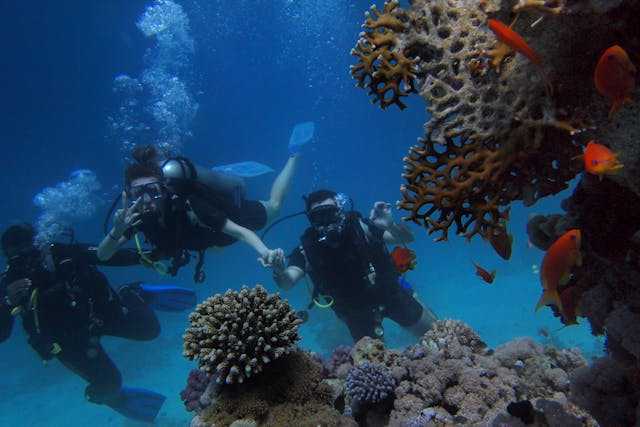
The Dodecanese Islands are celebrated for their exceptional diving conditions. The Cave of Seals off Rhodes is a standout location where divers can interact with friendly seal families. Rhodes also features the Plimmiri wreck, a great spot for wreck diving certifications. Kos and Nisyros offer volcanic terrains and a variety of marine life.
Popular Diving Spots: Cave of Seals, Plimmiri, Kos Island, Nisyros, Symi, Rhodes Island, Marine Park, Caves of Antony Quinn.
Unique Underwater Attractions: Shipwrecks, octopus, rays, morays, caverns, sea urchins, starfish, caves.
Depth: 5m - 30m
Costs: Individual dives – €30 - €65; Courses – €330 - €520
Best Time to Go Diving in Greece
The best time for scuba diving in Greece is from May to October. During this period, the weather is warm, and sea temperatures range between 20°C and 26°C (68°F to 79°F), ensuring comfortable conditions for diving. Visibility is at its best during these months, often reaching up to 30 meters (100 feet), which provides excellent underwater views. The summer months of June through September are particularly popular, though diving in the shoulder months of May and October can offer quieter dive sites and favorable conditions.
How Must Does it Cost to Dive in Greece?
Scuba diving in Greece offers a range of options to fit different budgets and preferences. For a single day of diving, you can expect to pay around €115 for two dives. If you’re planning multiple days, a package for five days with ten dives costs approximately €540. Specialty dives, such as a night dive, are priced at €85 each. For those looking to get certified, courses vary from €95 to €570. Advanced training and specialty courses, such as the Advanced Open Water Course or Deep Diver Specialty, range from €355 to €345. Freediving courses start at €85 for a Discover Freediving session and go up to €490 for an Advanced Free Diver Course.
Essential Items to Pack for Scuba Diving in Greece
Before setting off, make sure to pack the following essentials:
- Valid ID
- Swimwear, dry bag, and towels
- Scuba diving gear (if you have your own)
- Hats, sunglasses, and sunblock
- First aid kit
- Most scuba diving operators in Greece provide equipment, but it's a good idea to check and ensure everything is in good working order before diving.
Tips to Remember Before Scuba Diving in Greece
- Dive only in designated areas and adhere to environmental guidelines and instructor instructions.
- Allow at least 2 hours after eating before diving.
- Avoid diving under the influence of alcohol or if advised against by a medical professional.
- Maintain a 12-24 hour gap between flying and diving.
Greece’s stunning coastline and vibrant underwater ecosystems make it an ideal destination for a scuba diving adventure. With its warm waters and rich marine life, the country offers year-round diving opportunities. To fully enjoy diving in Greece, consider securing International Travel Insurance that covers adventure sports like scuba diving. This ensures peace of mind while exploring Greece’s magnificent underwater world.